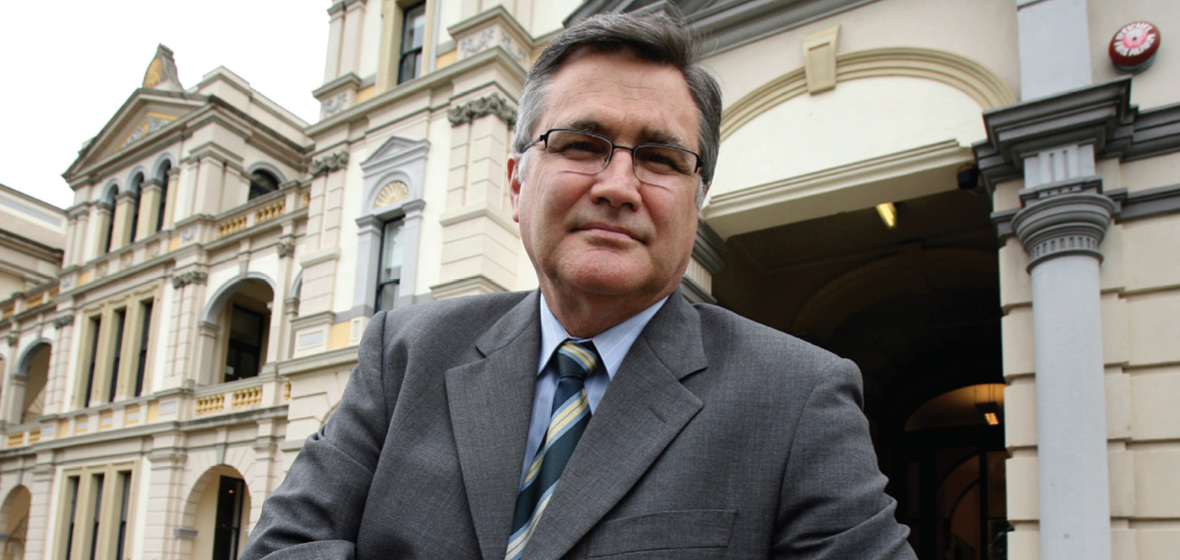Geoff Gallop was a year into his second term as Premier of Western Australia in 2005 when he resigned to focus on tackling depression. Taking the measure of his illness has led to a new career and life in pursuit of happiness. Over lunch the Sydney-based Emeritus Professor discusses how the legal profession can look after its mental health and what he misses about politics.
As a politician, Geoff Gallop relished the complexity of trying to solve society’s hardest-to-fix problems. It is little wonder that in his own darkest days he found lightness in learning.
“It is a bit in my character anyway to think like this, but I started to study the subject of depression, I really read about it,” he tells LSJ.
“And that, in and of itself, is a form of therapy. You’re starting to understand and think, ‘oh, I can see a connection there’. I can see the way that life can get out of control.
“The capacity of someone to open up and talk about this is very much part of the solution. The incapacity of people to open up and talk about depression is part of its definition, because you are locked up in yourself and you are not responding to the world around you and it looks like there is no good anywhere. There’s no escape.
“So once people talk about it, it is very important because through that process they then start to take some control, which they have lost. Depression controls you, rather than the other way around.”
LSJ dines with Gallop at Mordeo Bistro and Bar, across the road from NSW Government headquarters where days earlier Premier Gladys Berejiklian stared down a threat from Deputy Premier and NSW Nationals leader John Barilaro to effectively move his team to the crossbench.
Across Australia, leaders have faced coronavirus-related scrutiny for months: criticism for being either too hard or too soft on restrictions, for over-prioritising the public health response or reopening the economy. Gallop watched closely as one of his later successors, WA Premier Mark McGowan, faced a court challenge from magnate Clive Palmer to reopen the state’s borders. Surely Gallop doesn’t miss this daily deluge of political drama?
So once people talk about it, it is very important because through that process they then start to take some control, which they have lost. Depression controls you, rather than the other way around.
“[One thing] I miss, and it is a great privilege, is getting all around the state and meeting people. You see the good side of human nature,” he says.
“You might create a new law, create a new policy and if those creations add value to your society, you get a tremendous sense of satisfaction. Unless you are in there participating in a tough business, you can’t do it. You’ve got to accept it’s a tough business but keep your eyes on the ball.
“As for the bad, it’s very adversarial. It can be very vicious. It is unrelenting. You can never escape from it and you are always being judged … I imagine for some young people deciding whether they are going to do a law career it is a similar thing. They might love the law and love what it can do but worry about fitting into a big firm and the pressures and whether they can cope.”
Gallop often recalls a quote from Australian academic Richard Eckersley, who in 1992 described young people as “the miner’s canaries of our society, acutely vulnerable to the peculiar hazards of our times”. In 2020, as younger generations graduate into a future where so much, from employment to housing, feels uncertain, he says those words feel particularly poignant.
“I think today we have a real challenge when it comes to young people and mental illness. I try to imagine I am one of those young people, and they look out there and they see a very disrupted world,” he says.
“Add to that the disruption that will come from climate change, and that’s a worry. I can understand young people being very concerned for their own futures and for some of those young people, sadly and tragically, it gets too much for them.
“I think that issue of young people, the youth suicide rates, we have got to take note and try to build a world where those people can have hope, just as I had hope when I was growing up in the 1960s. We had a lot of hope as to how we could change that world. Today, it looks very, very difficult.”
On the day he quit as Premier, Gallop told a packed press conference, “My doctors advised me that with treatment, time and rest this illness is very curable. However, I can’t be certain how long that will take.”
More than a decade on, life is plentiful.
“I think there has definitely been a positive development with respect to awareness of mental illness. And that’s all been good. It’s not to say we have overcome stigma, particularly in relation to very serious forms of mental illness,” he tells LSJ.
Gallop is an Emeritus Professor at the University of Sydney and advocates for the decriminalisation and legal regulation of drug use though his work at the Global Commission for Drug Policy.
“I mean in a sense the whole legal framework we have now has handed over power to criminal people and it is ludicrous … having criminal penalties associated with drug use makes it very difficult for people who have challenging conditions to deal with them,” he says.
He sees parallels between the “unrelenting” worlds of law and politics and believes the next step is moving past awareness campaigns to broader structural reform.
“This is challenging because that dog-eat-dog world creates some bad outcomes and whether you’ve got to have it for other reasons and therefore you’ve got to accept the bad outcomes, that to me is giving the game away,” he says.
“We’ve got to look deeper at the ways we can make it a better environment for people’s wellbeing.
“And of course there are the structural issues that remain difficult to tackle. In the law profession, of course, the nature of the work of a lot of lawyers, the pressures they are under, and whether we have dealt with those issues as well as we have dealt with just getting general awareness, I am not so sure we have found the perfect balance yet.”





